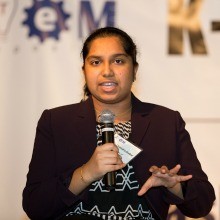
Pooja Chandrashekar, a 2015 graduate of Thomas Jefferson High School for Science and Technology (TJHSST) and current freshman at Harvard University, introduced TJHSST Principal Dr. Evan Glazer by explaining how he impacted her life.
“His endless support of science and technology programs has been incredibly important in pushing and empowering TJ students forward, and celebrating their success. He’s involved in every aspect of TJ’s culture and connected to his students, even after graduating.”
“Throughout my time at TJ, Dr. Glazer was available whenever I wanted to talk and asked how he could help. I wanted to thank you for being a wonderful mentor, for being there for us, for making TJ what it is and creating TJ what it is, encouraging a crowd to come out and see you.”
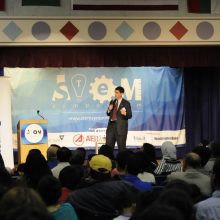
Dr. Glazer’s presentation answered how parents can maintain their child’s interest in STEM.
“I’m dedicated to advancing education, not just at TJ, but in the region,” he said. “There are some significant challenges ahead.”
He outlined six key factors that motivate students to pursue STEM: awareness of career opportunities; academic preparation and achievement; identification with STEM careers; self-efficacy; external environmental factors; and interest, enjoyment and motivation.
- Awareness of career opportunities — “There’s a considerable gap in skills. We have career fairs working to get students involved from a young age, along with special interest groups,” such as Discover Your STEM Type, which create awareness.
- Academic preparation and achievement — Students who are coming from households who lack resources or are from underrepresented minorities are not entering competitive universities or pursuing competitive careers. He mentioned the Jack Kent Cooke Foundation’s Young Scholars Program, which helps those who do not have the financial means to attend college, do so. It’s also important to understand the stress that comes with overachievement. (Virginia STEM and Governor’s schools, Project Lead the Way)
- Identification with STEM careers — “Some students identify STEM as a certain stereotype about what being a scientist or engineer is about. These impact students’ abilities to identify with different careers. (Goldiebloxs, Becoming Everything You Are, National Society of Black Engineers)
- Self-efficacy — “Everyone is actually a ‘math person,’ but some how our society has identified that only some people are ‘math people.’ The best thing that students can experience when they’re growing up, if they want to learn, is failure. For some reason, our systems our designed to constantly reward success and to avoid failure. We should be celebrating the things we get wrong because those are the best learning experiences. That’s really when students are going to grow and learn. … The primary reason kids succeed is because they keep at it.”
- External environmental factors — “The things parents say impact students the most. Your rolemodeling behavior has the biggest impact on your kids. If you want your kids to develop really good habits, you have to be a really good role model. It’s about being passionate and creating opportunities.”
- Interest, enjoyment and motivation — It’s also about having access to opportunities, Glazer said, and referenced GMU STEM for elementary students and hackathons as examples of how students can get involved locally.
Chandrashekar has a record of achievement in STEM and mentoring younger girls. When she graduated from TJHSST, The Washington Post announced she was accepted by all 14 schools she’d applied to — including the eight Ivy League universities — and Stanford, MIT, Duke, the University of Virginia, the University of Michigan and Georgia Tech. Chandrashekar chose Harvard and is studying biomedical engineering, global health and health policy. Her interests also include computer science, neuroscience and entrepreneurship.
She is passionate about encouraging young people to pursue their interests in STEM. While still a high school student, Chandrashekar created a nonprofit organization, ProjectCSGIRLS, dedicated to encouraging young girls around the world to pursue careers in the STEM fields and closing the gender gap in the tech industry.
The 2016 K-12 Stem Symposium is a free, exciting and all-day forum that equally engages children, parents, and teachers, coupled with corporate, government, academia and non-profit executives alike from the STEM fields. The next K-12 STEM Symposium will be held on March 18, 2017.
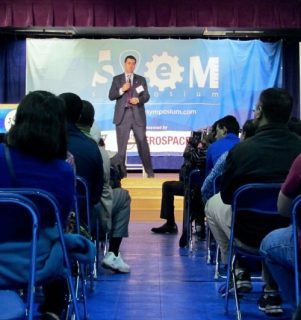
Dr. Evan Glazer speaking to the STEM Symposium audience
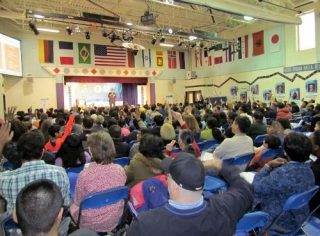
Dr. Evan Glazer fielding questions from the large audience
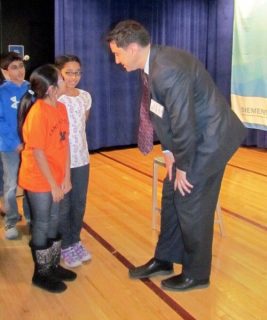
Dr. Evan Glazer having a conversation with some fans


